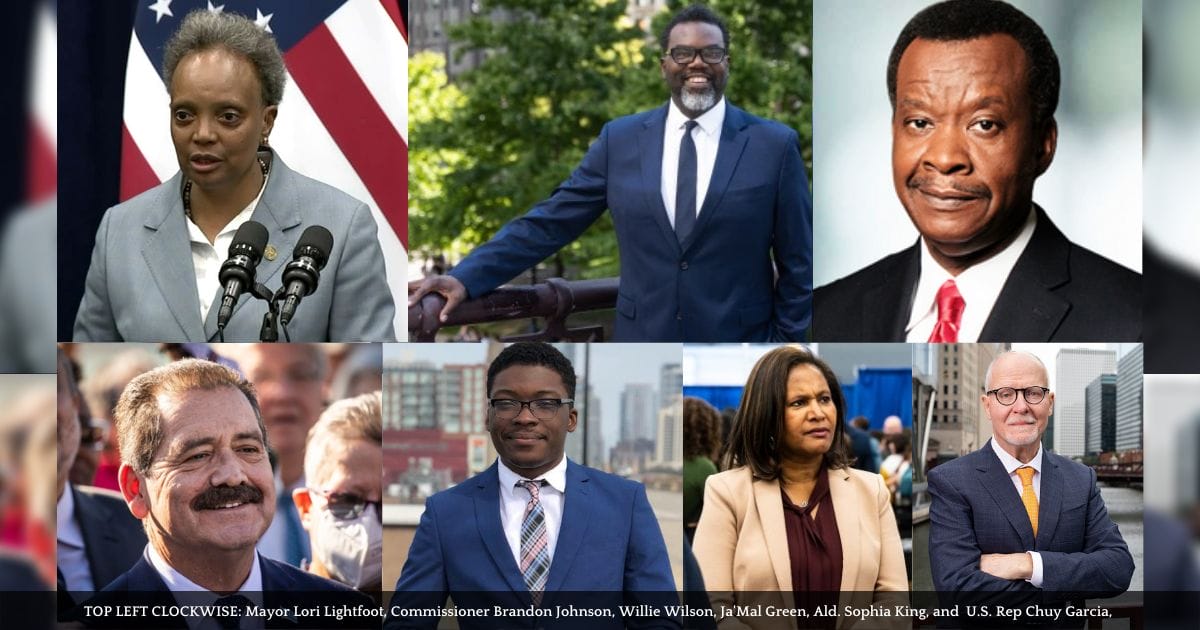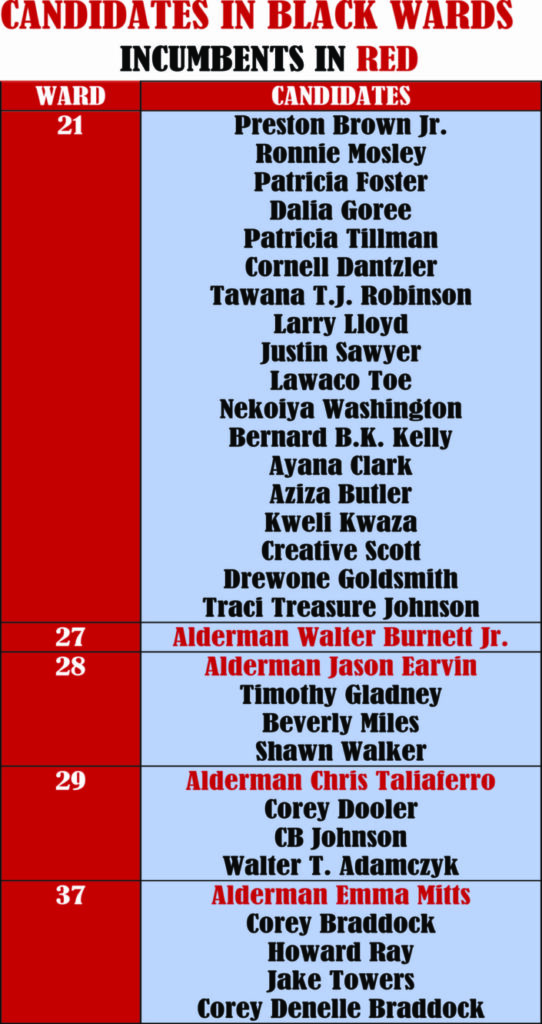A staggering 95 aldermanic candidates in Chicago’s 17 Black wards submitted their signatures to the Chicago Board of Elections before the deadline expired on Monday, November 28. In the mayoral race, Lori Lightfoot was among 11 candidates seeking to get their names on the ballot for the city’s municipal elections on February 28.
After months of hitting the streets, supermarket parking lots, polling precincts and Black churches, aldermanic and mayoral candidates submitted stacks of petitions with thousands of signatures. After a week of processing the entries, the Chicago Board of Elections released the official list of mayoral and aldermanic candidates. In several Black wards, there are crowded races that will likely lead to a run-off as candidates must win 50 percent of the vote to win outright. The challenge round, which expires December 5, is expected to be the most intense in the 4th, 5th, 6th and 21st Black wards, where a City Council seat is up for grabs among a stacked list of political newcomers who are running where there is no incumbent alderman seeking re-election.
The 21st Ward, which is headed by outgoing Alderman Howard Brookins, Jr., has 15 candidates, the largest of Chicago’s 17 Black wards.
The next largest list of candidates is in Alderman Roderick Sawyer’s 6th Ward, where 13 candidates are vying to fill his seat as he runs for mayor.
In the 5th Ward, 12 candidates are seeking to replace 24-year alderman Leslie Hairston. On Sunday, November 20, Renita Ward announced her candidacy at Bryn Mawr Community Church’s worship service.
In Sophia King’s 4th Ward, there are eight candidates who seek to replace her as she challenges Lightfoot in the mayoral race. On November 17, Matthew Khari Humphries kicked off his aldermanic campaign for the 4th Ward at the event space 43B in Bronzeville.
In the 24th Ward, Monique Scott faces seven candidates in her first re-election campaign since she was appointed by Mayor Lightfoot in June after her brother, former Alderman Michael Scott, abruptly retired to take a high-paying job with Cinespace Chicago Film Studio. Leading the pack with nearly $105,000 in campaign cash from donors that include her brother and Cinespace, Monique faces Vetress Boyce, who ran against her brother in 2015. Larry Nelson, another opponent of Monique’s, applied to succeed her brother but lost when Lightfoot chose Monique for the vacant seat.
With many political newcomers in aldermanic races, experienced candidates are lawyering up to scrutinize and discredit signatures that may come from unregistered voters or voters from other wards. Aldermanic candidates are required to submit at least 473 valid signatures to get on the ballot. Mayoral candidates are required to have 12,500 signatures.
On the day of the deadline, Mayor Lightfoot filed her petitions that included 40,000 signatures. She faces a big hurdle to get the Black vote with seven Black candidates in the mayoral race. Lightfoot remains optimistic.
“Almost four years ago to the day, I handed in my petitions as a longshot candidate for mayor of Chicago. The pundits and political machine counted us out — but we are standing here today because the voters believed in my vision to build a City Hall that put people and neighborhoods first,” said Lightfoot. “Of course, change doesn’t happen overnight, and our work is far from finished. But, we’re making real progress on the issues that matter most. Today, we’ve shown that voters are excited about making sure we are able to see that work through.”
Businessman and philanthropist Willie Wilson, who won 13 Black wards in the city’s 2019 election, told reporters he filed more than 61,000 signatures. Congressman Jesús “Chuy” García (D-Chicago) told reporters late Monday afternoon that he filed approximately 48,000 signatures.
Cook County Commissioner Brandon Johnson said he filed approximately 42,000 signatures; followed by Paul Vallas, with 41,000 signatures; Alderman Sophia King (4th Ward), with 37,000 signatures; Ja’Mal Green, with 30,000 signatures and state Rep. Kam Buckner, with 24,000 signatures.
Lightfoot submitted her signatures at 9 a.m., which means she will not be entered in a lottery for her name to appear at the bottom slot on the ballot the second highest visible spot after the first slot. Garcia will instead be given the last slot.
Lightfoot said that in her first term she has undertaken an ambitious agenda of expanding opportunity and inclusive economic growth across Chicago’s neighborhoods and communities. She has led the city through the unprecedented challenges of a global pandemic. Lightfoot said she expanded funding for community-based violence prevention and implemented measures to combat gang violence. She also praised the city’s COVID-19 vaccinations and distributions throughout the city.
But Lightfoot faces detractors and challenges as she seeks a second mayoral term at City Hall. A crime surge is sweeping across the city, including affluent neighborhoods. The Mag Mile is struggling to keep tenants. In the Black community, many still remember the city’s police force allowing businesses to be looted on the South and West sides as bridges were raised and other efforts were made to protect businesses in the Loop and the North Side during the George Floyd protests in 2020.
During her first term, Lightfoot had an ordinance passed that introduced thresholds on speed camera tickets that disproportionately hurt Black and Latino wards. None of the officers who wrongfully raided the home of Anjanette Young were disciplined, suspended or fired. Lightfoot also opposed the renaming of Lake Shore Drive after the city’s founder, Jean Baptiste Pointe du Sable, and she broke several campaign promises, including reopening the mental health clinics that her predecessor closed in 2012. While her Invest South/West Initiative aims to pump over $1 billion into Black neighborhoods, most of those developments have yet to break ground as they simply remain a vision.








